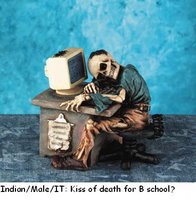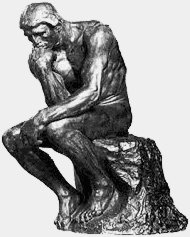"Yeah, but you know how it is man. Being one of like a million male/indian/IT guys, it's really tough for me to get in at a top school.". I just nodded along and made appropriate sounds indicating my complete agreement with his assessment about how life is a bitch for some people. I just didn't have the energy to get into a long debate at that point.
But now that I'm confortably ensconsced in bed with a hot mug of coffee after an enjoyable albeit tiring day at the golf links, I can pontificate on my views on this topic. Yes, there are

a lot of guys that fall in that particular category. However, I don't completely buy the argument that that makes it tougher for these people to get in. Every applicant at a top B school needs to put together a unique story in their application. They need to demonstrate leadership potential and a track record of continued success and career progression along with decent community involvement/extra curriculars. These are the only factors by which an applicant can really seperate himself from the pack. This is true irrespective of your nationality or profession. No one is going to be admitted *just* becase of their high GMAT score and number of years of work experience (so it's not like the Indian IT guy is missing out on getting admitted since every other Indian IT guy has a great GMAT score too) and no one is going to be rejected *just* because of a GMAT score that is lower than their particular demographic (which is what the IMT guys often imply).
The white male with a GMAT score of 730 and 5 years of work experience at SUN including being the project lead or 5 years of work experience in some generic field on Wall Street, but nothing else, has just as little chance of getting in at a top school as the Indian dude lamenting the fact that it's harder for him because of his particular demographic since he has to set himself apart from all the other Indians. He doesn't. He needs to set himself apart from all the applicants. The non Indian tech guy or the non Indian banker will have to show something to set himself apart just as the IMT would.
The argument is made that if there are a 100 seats available and 35 Indian IT guys are applying for those seats as opposed to maybe 10-15 guys from any other given demographic, it implies it is tougher for the Indian dude since the school is looking for diversity and is unlikely to admit more than a given number of Indians. While it is true that schools are indeed looking for diversity, I don't believe they would pass on a truly deserving candidate just in the interest of diversity. If you can show in your application that you bring something unique to the table within the *entire* applicant pool, you will be admitted irrespective of nationality. This remains true for the Indian IT male, the American banker male and the European consultant male. It's not just about setting yourself apart within a particular demographic. It's about proving your worth within the entire candidate pool.
The logic cited by Indian guys is that since every other Indian guy comes from IT and has a strong GMAT score, it is harder for him. By reverse logic, that implies that the same guy would have had it much easier and would have had a great chance of getting in if he were not Indian and/or not from IT. Which means he would have had it easier if he were an European but with the same profile i.e. a generic IT job? Or he would have had it easier if he were an Indian from a non traditional field?
I believe the first statement does not hold. If his nationality were different i.e. not Indian and the rest of the profile were the same i.e. generic IT job, solid GMAT, good acads and nothing to set him apart or make him interesting, his chances of getting in would in no way be better than the Indian IT guy. So his Indian/IT tag is not holding him back. It's the lack of other things that a business school looks for, that is.
The second statement might have some truth to it. But then that holds irrespective of your nationality. If you come from a non-traditional field you *always* have an advantage since your application stands out.
The bottom line is that the Indian IT male has as much of a shot of getting in as anyone else. It's not just the world that is flat, the B school application field is flat too. If you can put together a unique/solid application that can stand up against the entire applicant pool, you will get in. I don't think there's ever a situation where adcom decides "all these Indian/IT/male applicants have *great* stories, but since we can take only X number of Indian/IT/Males, lets reject the rest". Neither do they say, "we are going to take X number of Indian/IT/Males. We have 40 applications and they all seem pretty similar i.e. great GMAT, decent work ex and good acads. Lets accept X number of them even though nothing really stands out except these things i.e. no intangibles, no leadership potential etc".
So how do we explain the fact that such a small percentage of total Indian/male/IT applicants make it to top B schools? Maybe they just don't fit the criteria? Just because a large number is applying and a large number has good GMAT scores does not imply that a large number has the other qualities required to be admitted or succeed (at B school).If every Indian/IT/male applicant had a great story about how he found a cure for the bird flu virus or how he started an orphanage or something, and a majority of these candidates were rejected, then I would agree that they were indeed being rejected because adcom wanted to maintain diversity within the class. Otherwise, the Indian/male/IT guy is playing by the same rules as the American/male/banker guy i.e. show some kind of unique leadership or set your application apart in some way, or get dinged.
PS: I decided to jot down these (extremely disjointed) views despite the fact that I realize that I may be way off base in my reasoning here, since it seems to be conventional wisdom backed by several esteemed admission consultants that the Indian/male/IT demographic is indeed a tough one. Also, this post is in no way meant to disparage any demographic.




